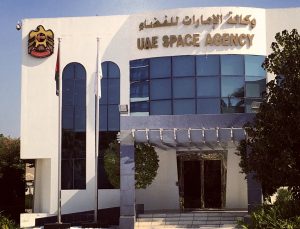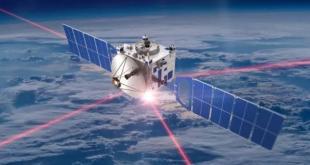
The UAE Space Agency’s influential Advisory Committee met in late April 2018 to review and assess the activities and developments of the Emirati space programme.
This third annual meeting, held in Abu Dhabi, included discussion of current and future space projects, along with methods of further developing the sector’s capabilities in scientific research, space technology, and human capacity.
In his welcome address, Dr. Ahmad Belhoul Al Falasi, Minister of State for Higher Education and Advanced Skills and Chairman of the UAE Space Agency, highlighted the Agency’s strategic role in cementing the UAE’s position internationally as an advanced space-faring nation.
Dr. Eng. Mohamed Al Ahbabi, Director General of the Agency, briefed the committee on the Agency’s latest developments and the current status of the national space sector, including the Emirates Mars Mission, the Mars 2117 project, Mars Scientific City and the UAE Astronaut Program. The briefing also included discussion of the UAE’s future manned space missions, means of further developing space science research capabilities, and enhancing international partnerships and collaboration.
Other key topics included the feasibility and funding of potential future projects, the capacity of national research institutions and universities to support proposed projects, the future of space agencies within the context of the expanding commercial space sector, and the emergence of artificial intelligence and its role in space exploration.
“The UAE Space Agency is working to facilitate the exchange of knowledge through cooperation with the world’s leading space agencies and organizations,” Dr. Al Falasi said, speaking on the sidelines of the meeting. “Through these meetings, we aim to strengthen our ambitious national space projects and ensure they are implemented in accordance with the highest international standards, in order to cement the UAE’s position as a leading space-faring nation.”
“Our Advisory Committee members have far-reaching experience in leading global space projects, drafting space legislation and laws, and supporting space science and scientific research. The Committee includes former astronauts who have spent long periods of time in outer space or have participated in a number of manned space missions and other missions to the International Space Station,” he added.
“The past year has been extraordinary with the launch of numerous ambitious projects and initiatives, which form a part of the UAE’s plans for the upcoming years and decades,” said Dr. Al Ahbabi. “We arranged these Advisory Committee meetings at a time when the Agency is putting the final touches on several important projects.”
Members of the UAE Space Agency Advisory Committee include
Jean-Jacques Dordain, former Director General, European Space Agency; Charles Elachi, former Director of the Jet Propulsion Laboratory and Vice President of California Institute of Technology; Farouk El-Baz, Director of the Center for Remote Sensing and Research Professor at Boston University; Ji Wu, chief scientist and project leader of Strategic Priority Programme on Space Science at the Chinese Academy of Sciences (CAS); Charles F. Bolden Jr., former NASA Administrator; Koppillil Radhakrishnan, former Chairman of the Indian Space Research Organisation (ISRO) and Honorary Distinguished Advisor at the Department of Space/ISRO; Joo-Jin Lee, former President of Korea Aerospace Research Institute; Koichi Wakata, Vice President of JAXA and a veteran of four NASA Space Shuttle missions, a Russian Soyuz mission, and a long-duration stay on the ISS; Sergei Konstantinovich Krikalev, Vice President of the S.P. Korolev Rocket and Space Corporation Energia and Administrator of the Yuri Gagarin Cosmonaut Training Centre.
 SpaceWatch.Global An independent perspective on space
SpaceWatch.Global An independent perspective on space




